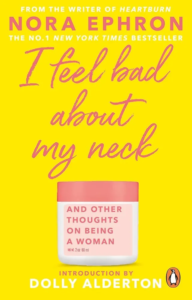The Wry Wisdom of Nora Ephron: Navigating Womanhood in “I Feel Bad About My Neck”

The Unavoidable Truth of the Aging Neck: A Humorous Entry Point
Nora Ephron, a name synonymous with sharp wit, insightful observation, and a distinctly female perspective, gifted readers with a treasure trove of essays throughout her illustrious career. Among these gems, “I Feel Bad About My Neck: And Other Thoughts on Being a Woman” stands out as a candid and hilarious exploration of the multifaceted experience of womanhood, particularly as it intersects with aging, beauty standards, relationships, and the everyday absurdities of life. Published in 2006, this collection showcases Ephron’s signature blend of self-deprecation, astute social commentary, and a profound understanding of the female condition, making it a timeless and relatable read for women of all ages. The titular essay, “I Feel Bad About My Neck,” immediately sets the tone for the collection. With characteristic honesty, Ephron laments the inescapable truth of an aging neck, a physical marker that stubbornly betrays the efforts to maintain a youthful appearance. This seemingly superficial concern becomes a poignant entry point into a deeper exploration of the pressures women face to conform to often unrealistic beauty standards. Ephron’s frustration is palpable, yet her delivery is laced with humor, allowing readers to both commiserate with her predicament and chuckle at the universality of such anxieties. The essay cleverly uses the neck as a metaphor for the aging process itself – something that can be concealed but never truly reversed, forcing a confrontation with the passage of time.
Everyday Absurdities and the Invisible Labor of Female Life
Beyond the physical, Ephron delves into the emotional and social landscapes of being a woman. Essays like “The Lost Wallet” and “I Hate My Purse” transform mundane objects into reflections on the chaos and contradictions of female life. Her struggles with organization, the ever-growing contents of her purse, and the frustration of a lost wallet become humorous anecdotes that resonate with the shared experiences of many women navigating busy lives. Through these seemingly lighthearted pieces, Ephron subtly highlights the often-invisible labor and mental load that women carry.
Navigating the Complexities of Romantic and Familial Bonds
The complexities of relationships, both romantic and familial, are another significant thread woven throughout the collection. In “Serial Monogamy: A Memoir,” Ephron humorously chronicles her evolving relationship with cookbooks, using them as a metaphor for the different phases and passions in her life. This witty approach allows her to touch upon themes of love, loss, and the constant search for connection in a uniquely Ephronian way. Her essays on parenting, such as “Parenting in Three Stages,” offer a refreshingly honest and often humorous take on the joys and challenges of raising children, navigating the transition from hands-on involvement to the bittersweet experience of the empty nest.
A Love Letter to New York: The City as a Backdrop for Female Experience
Ephron’s writing is imbued with a strong sense of place, particularly her beloved New York City. Essays like “The Perfect Strudel” and anecdotes sprinkled throughout the book paint a vivid picture of urban life, with its culinary delights, cultural quirks, and the ever-present backdrop of a bustling metropolis. Her love for the city is evident, and she uses it as a stage upon which many of her observations about life and womanhood unfold.
Ephron’s Distinctive Voice: Wit, Honesty, and Relatability
What makes “I Feel Bad About My Neck” so enduring is Ephron’s distinctive voice. Her writing is conversational, witty, and deeply personal, making readers feel as though they are sharing confidences with a close friend. She doesn’t shy away from her own vulnerabilities and imperfections, which fosters a sense of intimacy and relatability. Her sharp wit is often deployed with a self-deprecating edge, allowing her to critique societal norms and personal anxieties without sounding preachy or judgmental. This ability to blend humor and poignant observation is a hallmark of her style and contributes significantly to the book’s charm and impact.
A Timeless Commentary on Womanhood: Finding Humor in Reality
Ultimately, “I Feel Bad About My Neck” is more than just a collection of humorous essays. It is a wise and insightful commentary on the realities of being a woman in contemporary society. Through her personal anecdotes and keen observations, Nora Ephron touches upon universal themes of aging, beauty, relationships, and the search for meaning in the everyday. Her ability to find humor in the mundane and to approach even the most challenging aspects of life with wit and honesty makes this book a comforting and thought-provoking companion for anyone navigating the complexities of womanhood. In a world often obsessed with youth and perfection, Ephron’s voice offers a refreshing dose of realism, reminding us that it’s okay to feel bad about our necks – and to laugh about it along the way.











